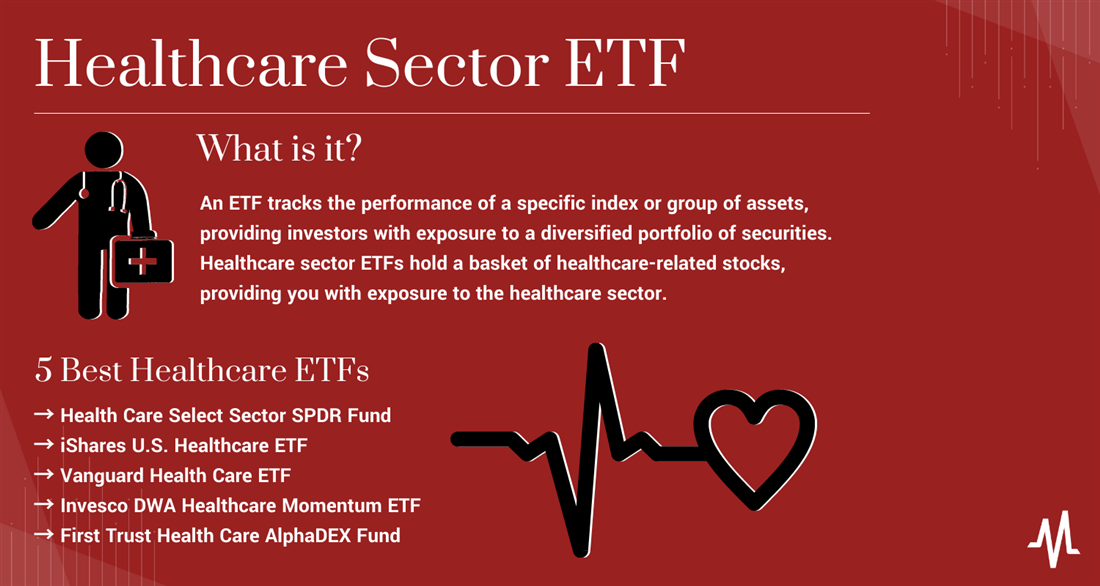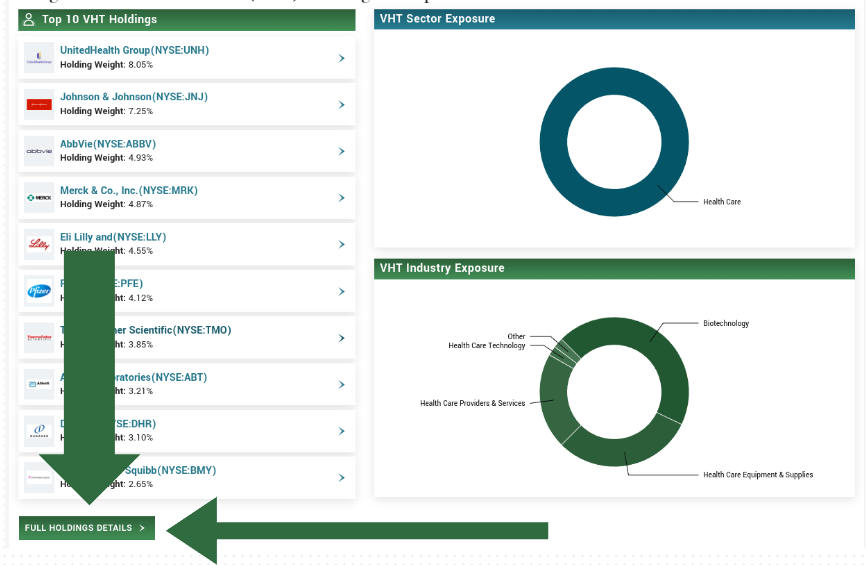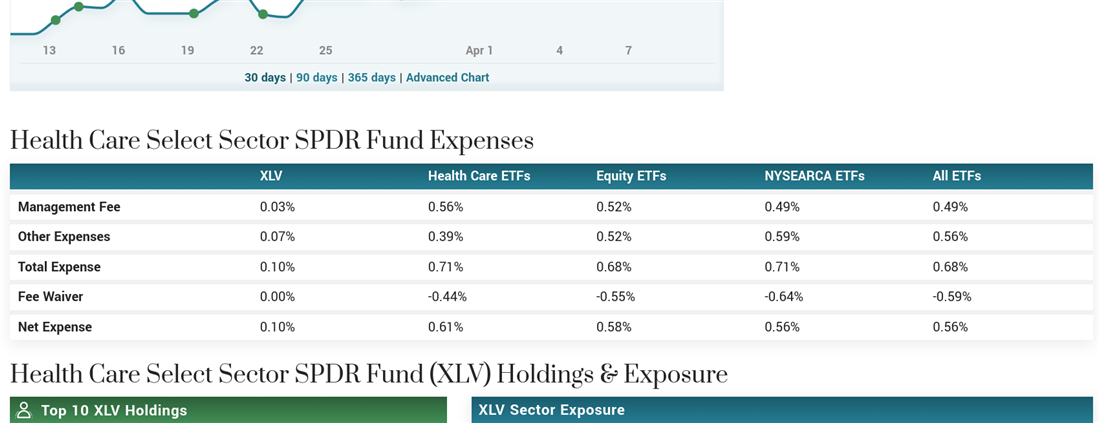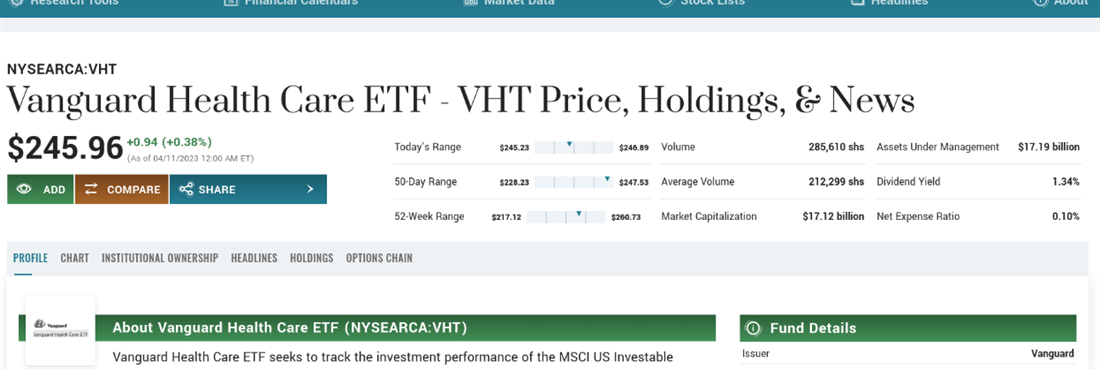
Healthcare is one of the largest and fastest-growing sectors in the global economy, with many opportunities for investors. From breakthrough treatments to innovative technologies, healthcare companies are at the forefront of innovation and are poised for growth in the years ahead.
For those looking to invest in the healthcare sector, healthcare sector ETFs can offer a convenient and diversified way to gain exposure to this dynamic industry. These funds provide investors with a basket of healthcare-related stocks, ranging from pharmaceuticals and biotech firms to healthcare providers and medical device manufacturers.
With so many healthcare sector ETFs available on the market, choosing the right one can take time and effort.
So let's look closer at five of the best healthcare sector ETFs, examining their investment objectives, expense ratios, holdings and performance. From the beginner investor just starting to explore the world of healthcare investing, or an experienced trader looking for new opportunities, this guide will provide the insights you need to make informed decisions about your healthcare industry ETF investments.
Overview of Healthcare ETFs
The healthcare sector is a broad category that includes companies researching, developing, manufacturing and distributing healthcare-related products and services. This can consist of pharmaceutical and biotechnology companies, medical device manufacturers, healthcare providers such as hospitals and clinics and healthcare services companies such as insurers and managed care providers.
An ETF, or exchange-traded fund, is a type of investment fund traded on an exchange like a stock. ETFs are designed to track the performance of a specific index or group of assets, providing investors with exposure to a diversified portfolio of securities. In the case of health care sector ETFs, these funds typically hold a basket of healthcare-related stocks, providing investors with exposure to the healthcare sector.
Investors interested in an ETF for healthcare sector assets can purchase a convenient and diversified stock allowing investors to gain exposure to the healthcare sector. Instead of buying individual healthcare stocks, which can be risky and require a lot of research and analysis, investors can purchase shares of a healthcare ETF and gain exposure to various healthcare-related companies. Investors can also research a healthcare ETF's individual holdings by researching the ETFs medical stocks on MarketBeat.
One of the main advantages of healthcare ETFs is their diversification. By holding a basket of healthcare-related stocks, investors can spread their risk across various companies, reducing their exposure to any company or sector. Healthcare ETFs can also provide investors with access to a wide range of healthcare-related industries, allowing them to participate in the growth potential of the sector as a whole. Additionally, healthcare ETFs can offer lower costs and greater liquidity than individual healthcare stocks, making them a popular choice among investors.

5 Best Healthcare ETFs
Our five best healthcare sector ETFs have been selected based on various factors, including their performance history, expense ratios and portfolio composition (the types of stocks in the portfolio). Each ETF offers slightly different exposure to the healthcare sector, so it's essential to understand their differences before making an investment decision. From broad-based healthcare ETFs to more focused options, these five healthcare ETFs represent some of the best options for investors seeking exposure to the healthcare sector.
Health Care Select Sector SPDR Fund
Health Care Select Sector SPDR Fund NYSEARCA: XLV is a popular and widely-traded ETF that provides broad-based exposure to the healthcare sector. The ETF's inception date was December 16, 1998, and State Street Global Advisors manages the ETF. With over $35 billion in assets under management, XLV is one of the largest healthcare ETFs.
The expense ratio for XLV is 0.10%, which is relatively low for a healthcare ETF. The ETF has a dividend yield of around 1.6%, which may appeal to income-oriented investors. The average daily volume for XLV is relatively high, with over 8 million shares trading hands on a typical day.
XLV's top holdings include some of the largest and most well-known healthcare companies, such as Johnson & Johnson NYSE: JNJ, Pfizer Inc. NYSE: PFE and UnitedHealth Group Inc. NYSE: UNH. The ETF also provides exposure to various healthcare sub-industries, including pharmaceuticals, biotech and healthcare equipment.
XLV's risk profile is generally moderate, including exposure to large and mid-cap healthcare companies. The investment objective of XLV is to provide investors with investment results that correspond to the performance of the Health Care Select Sector Index, a subset of the S&P 500. This ETF typically appeals to investors seeking broad exposure to the healthcare sector.
iShares U.S. Healthcare ETF
The iShares U.S. Healthcare ETF NYSEARCA: IYH is a popular choice for investors seeking exposure to diversified companies in the healthcare sector. This fund has a long-term track record of solid performance and is an option for long-term investment investors.
The expense ratio for IYH is 0.39%, which is lower than the average expense ratio for funds with similar holdings. The ETF has a dividend yield of around 1.11%, which can provide investors with additional income.
The average daily volume for IYH is over 40,000 shares, indicating a moderate level of liquidity. Additionally, the ETF has over $3 billion in assets under management, which is a testament to its popularity among investors.
IYH was launched in 2000 and is managed by BlackRock, one of the world's largest asset managers. The fund's top holdings include healthcare giants such as Johnson & Johnson, Pfizer and Merck & Co NYSE: MRK. The ETF offers exposure to a similar set of companies as XLV but with a slightly different weighting methodology.
From a risk perspective, IYH is considered a moderately conservative investment. The fund has a diversified portfolio of healthcare companies, which helps to mitigate the risks associated with investing in any single company. The investment objective of IYH is to track the performance of the Dow Jones U.S. Health Care Index represents the healthcare sector of the U.S. equity market.
iShares U.S. Healthcare ETF is an attractive option for investors looking for a slightly different healthcare sector investing approach than XLV. With its strong long-term performance, low expense ratio and high liquidity, IYH may be suitable for those seeking a long-term investment in the healthcare sector.
Vanguard Health Care ETF
Vanguard Health Care ETF NYSEARCA: VHT is an ETF that tracks the MSCI U.S. Investable Market Health Care 25/50 Index, providing exposure to a broad range of large-, mid- and small-cap healthcare stocks in the U.S. market. This ETF has a low expense ratio of 0.10%, making it a cost-effective option for investors seeking to invest in the healthcare sector.
VHT has provided robust performance over the years, making it an attractive option for investors with a long-term investment horizon. The fund offers a long-term track record of solid performance, though it's worth noting that past performance does not guarantee future results.
The ETF also has a solid dividend yield, which makes it an attractive option for income-seeking investors. Additionally, this ETF's average daily trading volume is relatively high, making it a liquid investment option for investors.
The fund started on January 26, 2004. Vanguard manages VHT and is one of the largest investment management companies in the world, which adds to the fund's credibility.
The top holdings in VHT include some of the most well-known companies in the healthcare industry, such as Johnson & Johnson, Pfizer Inc. and UnitedHealth Group Inc. The sector allocation is well-diversified, with pharmaceuticals, biotech and healthcare equipment industries represented as the top three sectors.
In terms of risk profile, VHT is considered to be a moderate-risk investment due to the inherent volatility of the healthcare sector. However, the broad-based exposure and diversified portfolio of the fund can help to mitigate some of the risks associated with investing in individual healthcare companies.
The investment objective of VHT is to provide investors with exposure to the healthcare sector in the U.S. market and to achieve returns that closely correspond to the performance of the MSCI U.S. Investable Market Health Care 25/50 Index. Overall, VHT is an attractive option for investors seeking broad-based exposure to the healthcare sector with low expense ratios and solid historical performance.
Invesco DWA Healthcare Momentum ETF
Invesco DWA Healthcare Momentum ETF NYSEARCA: PTH is an exchange-traded fund that seeks to track the performance of the Dorsey Wright Healthcare Technical Leaders Index. This index identifies and captures price momentum in the healthcare sector by selecting companies with strong relative strength characteristics. The fund is excellent for investors seeking exposure to healthcare stocks exhibiting strong price momentum.
The expense ratio for PTH is higher than some other healthcare ETFs, but it offers the potential for higher returns due to its focus on momentum investing. The fund has a low dividend yield, but its emphasis on capital appreciation rather than income generation may suit investors with a longer-term investment horizon.
The ETF's average daily volume and assets under management are relatively low compared to larger healthcare ETFs. However, this may be due to its focus on a specific investment strategy. The fund was launched in 2006, making it a relatively mature option for healthcare sector investing.
The issuer of PTH is Invesco, a global investment management firm with a long history of managing ETFs and other investment products. The fund's top holdings include large- and mid-cap healthcare companies, with a particular focus on biotechnology and pharmaceuticals.
Investors should know that the focus on momentum investing may result in higher volatility and potentially more significant risk than other healthcare ETFs. As with any investment, it is essential to carefully consider the risks and potential rewards before deciding.
First Trust Health Care AlphaDEX Fund
The First Trust Health Care AlphaDEX Fund NYSEARCA: FXH is an ETF focusing on the healthcare sector and seeking exposure to companies with strong growth potential. The ETF uses a proprietary stock selection methodology called the AlphaDEX system, which identifies companies based on growth factors such as revenue growth, price momentum and earnings growth. FXH's holdings are reconstituted and rebalanced quarterly to maintain its focus on growth-oriented companies.
FXH's expense ratio is slightly higher than some of its peers in the healthcare sector, but it may be worth it for investors seeking exposure to companies with solid growth potential. The ETF's dividend yield is modest and may not be a primary consideration for investors looking for growth stocks. It has a moderate daily trading volume, indicating it is a reasonably liquid investment.
The ETF has existed since May 2007 and has grown substantially, with over $1.5 billion of assets under management. The issuer of FXH is First Trust Advisors, a reputable and established provider of investment products.
FXH's top holdings are primarily large-cap healthcare companies, with pharmaceutical and biotech firms making up a significant portion of the portfolio. This ETF may be suitable for investors who are comfortable with the potential risks associated with investing in individual stocks within the healthcare sector, as it is more concentrated than some of its peers.
Keys to Investing in Healthcare ETFs
Investing in healthcare ETFs can be an excellent way for investors to gain exposure to the healthcare sector without picking individual stocks. However, as with any investment, investors should consider certain key factors when selecting a healthcare ETF. Let's take a moment to discuss some of the critical considerations for investing in healthcare ETFs, including diversification, expense ratios, liquidity and risk management. By understanding these factors, investors can make more informed decisions about which healthcare ETFs may suit their investment goals and risk tolerance.
Diversification
One key factor to consider when investing in healthcare ETFs is diversification, which can help reduce the risk of concentration in any one area. When selecting a healthcare ETF, investors should look for those that offer exposure to a diverse range of healthcare sub-industries and companies. This can help ensure the ETF is adequately concentrated in one area, such as pharmaceuticals or biotech. Additionally, investors should consider the geographic diversity of the ETF, as exposure to international markets can also help to diversify the portfolio further.
One tip for investing in healthcare ETFs is avoiding overexposure to any sub-industry or company by spreading investments across multiple healthcare ETFs or incorporating other sectors into a well-diversified portfolio. You can use MarketBeat's overview of stock sectors to learn more about each sector and how to diversify your portfolio further. If you want to dig into a particular ETF's diversification, a great place to get started is MarketBeat's "full holdings" page, which is provided for each ETF. You can find this button on the left side of each profile directly under the ETF's top holdings list.

Expense Ratios
Expense ratios are essential when investing in healthcare ETFs, as they can significantly impact an investor's returns. Investors should compare the expense ratios of different healthcare ETFs to identify cost-effective options. Lower expense ratios are generally preferred to help minimize costs and increase returns.
One tip for investors when evaluating expense ratios is to look beyond the management fee and consider any other fees or expenses associated with the ETF, such as trading costs or bid-ask spreads. To dig into expense ratios for a particular ETF, review that ETF's MarketBeat profile. Pay attention to the breakdown of expenses halfway down the page; it even provides other valuable metrics regarding expense ratios.
It's also worth noting that some healthcare ETFs may have higher expense ratios due to their unique investment strategies, such as active management or proprietary stock selection methodologies. In such cases, investors should evaluate whether the potential benefits of these strategies outweigh the higher costs.

Liquidity
When investing in healthcare ETFs, liquidity is an essential factor to consider. Investors should look for ETFs with a high average daily volume and significant assets under management, indicating sufficient liquidity to trade the ETF without experiencing substantial price fluctuations.
Additionally, investors should consider the daily range spread, the difference between the day's highest price for an ETF share and the day's lowest price. A narrower daily spread indicates that there is more liquidity in the market for the ETF. It is generally advisable to refrain from trading ETFs with low liquidity, as this can result in difficulty in buying or selling shares at desired prices or, even worse, significant price fluctuations.
MarketBeat has helped simplify this process by providing this information in the header of every listing, making it much easier to see if a particular asset aligns with your specific goals.

Risk Management
When evaluating the risk profile of a healthcare ETF, investors should consider the historical volatility and exposure to market fluctuations to ensure that it aligns with their investment objectives and risk tolerance. It's important to remember that higher-risk ETFs may offer the potential for greater returns, but they can also lead to more significant losses in down markets.
To manage risk, investors may consider diversifying their healthcare ETF holdings, investing in ETFs with lower volatility or investing in defensive healthcare subsectors. Additionally, investors can monitor the ETF's performance over time to ensure it aligns with their investment goals and risk tolerance. Once you have found the ETF that fits best into your portfolio, you might also want to review the ETF's price targets and analyst ratings for that ETF.
Consider Investing in Healthcare Sector ETFs
Investing in healthcare sector ETFs can offer investors the opportunity to gain exposure to this growing and dynamic industry while minimizing risk and costs. Investors can decide which healthcare ETFs align with their investment objectives and risk tolerance by carefully considering factors such as diversification, expense ratios, liquidity and risk management.
While these ETFs offer different approaches and investment styles, they all provide exposure to the healthcare sector and have a track record of solid performance. As with any investment, investors must do their due diligence before making investment decisions.
FAQs
Now that we have discussed the five best healthcare sector ETFs and some key factors to consider when investing in healthcare ETFs, you may have some questions about the topic.
In this FAQ section, we will address some common questions that investors may have about healthcare ETFs, including their benefits, risks and how to choose the right one for your investment portfolio.
What is the best healthcare ETF?
There is no single "best" healthcare ETF, as different investors may have different investment objectives and risk tolerances. However, investors can consider various factors such as diversification, expense ratios, liquidity and risk management when selecting a healthcare ETF that suits their needs.
What is the biggest healthcare ETF?
As of the writing of this article, the most significant ETF healthcare stock in terms of assets under management is the Health Care Select Sector SPDR Fund NYSEARCA: XLV that we covered in this article. This ETF tracks the Health Care Select Sector Index, which includes large-cap healthcare companies.
What are the top five healthcare ETFs to buy?
The top five healthcare ETFs to buy may vary depending on an investor's specific needs and preferences. However, some popular options among investors include the Health Care Select Sector SPDR Fund (XLV), iShares U.S. Healthcare ETF (IYH), Vanguard Health Care ETF (VHT), Invesco DWA Healthcare Momentum ETF NYSEARCA: PTH and First Trust Health Care AlphaDEX Fund NYSEARCA: FXH.
It's essential to conduct thorough research and analysis before making any investment decisions. One way to help you choose a suitable ETF is to compare healthcare ETF stocks on MarketBeat.
Before you consider BlackRock, you'll want to hear this.
MarketBeat keeps track of Wall Street's top-rated and best performing research analysts and the stocks they recommend to their clients on a daily basis. MarketBeat has identified the five stocks that top analysts are quietly whispering to their clients to buy now before the broader market catches on... and BlackRock wasn't on the list.
While BlackRock currently has a "Moderate Buy" rating among analysts, top-rated analysts believe these five stocks are better buys.
View The Five Stocks Here
Need to stretch out your 401K or Roth IRA plan? Use these time-tested investing strategies to grow the monthly retirement income that your stock portfolio generates.
Get This Free Report
